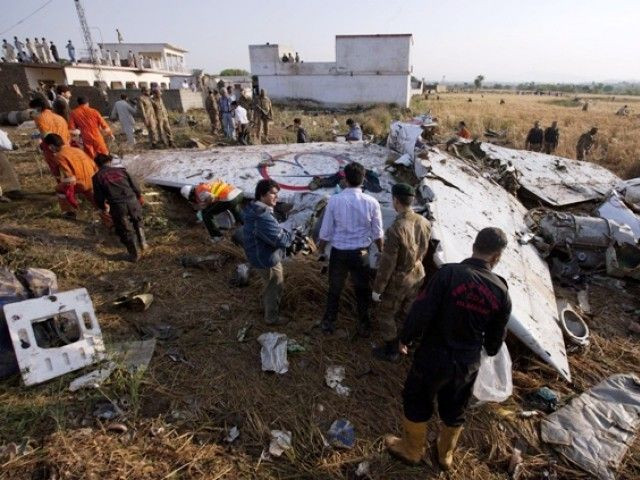Pakistan’s Bhoja Air Crash Blamed On Poor Crew Training, But Is Indian Air Safety Even Worse?

Investigators in Pakistan have found that a deadly airplane crash in April 2012 in the north of the country was caused by a poorly trained cockpit crew.
Pakistan’s Civil Aviation Authority (CAA) has determined that the pilots of the domestic Bhoja Air Boeing 737 -- a jetliner coming from Karachi that crashed in Rawalpindi, killing 127 people, including six crewmembers -- were not adequately trained in how to use its automated flight deck. The aircraft burst into flames as it approached the Benazir Bhutto International airport near Islamabad during a storm. No one survived the catastrophe -- many of the dead bodies were charred beyond recognition -- the second-deadliest air disaster in the country’s history. (The worst air tragedy in Pakistan’s history occurred in July 2010 when an Airblue plane crashed into the Margalla Hills just north of Islamabad, killing 152 people.)
Specifically, the CAA found that the plane’s captain, Noorullah Khan, 58, and his co-pilot were trained to fly the Boeing 737-200 but not the more advanced 737-236 (the craft that crashed on that fateful day), which features an automated flight deck. “The information with regards to automation capacities of aircraft was not in the knowledge of [the] cockpit crew even after [their] formal ground schooling, as the ground schooling did not cater [to] the automation of aircraft,” the report stated, according to Agence France Presse.
CAA also cited “ineffective management of the basic flight parameters” such as air speed and rate of descent as the principal factors behind the tragic incident.
The Express Tribune newspaper reported that Captain Khan was a veteran pilot from the Pakistan Air Force with more than 10,000 hours of flying experience under his belt. But the eight-member investigative team of investigators found that the pilot was gripped in panic during the inclement weather as he spoke to the control tower upon approach. He apparently did not trust the plane's automatic technology and even seemed confused by the fact that that the plane was moving at a speed of 220 knots instead of 190.
Bhoja’s operations were suspended by the government shortly after the crash and has dissolved.
In the wake of the CAA’s findings, the Tribune reported that Pakistan’s Federal Investigation Agency (FIA) will also make an inquiry into the disaster upon receiving a summons from a Judicial Commission. Thereafter, a judgment could be made on proper compensation to victims’ families. “We are waiting for a summons,” said a senior FIA official. “Only [the] FIA has leads which indicate the reasons [behind] the crash. Our officials have completed their homework but they haven’t been able to question anyone except Farouk Omar Bhoja [the 70-year-old former chairman of the airline].”
The Tribune reported, however, that Farouk Bhoja only owns 5 percent of the company’s shares, while CEO Arshad Jalil, his wife and his son together control 80 percent of shares. The Jalil family reportedly moved to Dubai after the crash, and they have already received $800,000 from the aircraft’s insurer, FIA said. “Now [Jalil] is waiting for compensation [to be paid] to the victims’ heirs ... Like all the cases, the CAA investigation report will blame the pilot for the accident and everyone will walk free,” an official told the Tribune.
Ironically, a few days prior to the CAA’s findings, the U.S. Federal Aviation Authority downgraded the airline safety ranking of Indian aviation to Category 2 from Category 1, bringing it below Pakistan’s rating. The FAA, after completing an audit last year, found 31 issues of “safety concern” with Indian airlines, including a lack of full-time safety inspectors. The FAA has “determined that India at this time is not in compliance with the international standards for aviation safety oversight,” according to notes provided to the Indian regulator, the Directorate General of Civil Aviation.
India now has a safety ranking similar to nations such as Bangladesh, Ghana and Indonesia. The downgrade means that Air India and Jet Airways will be prohibited from making an increased number of flights to the United States.
The Indian government’s aviation officials expressed confusion and surprise over the downgrade. “They have downgraded us to category 2. It is very disappointing and also surprising,” Indian aviation minister Ajit Singh said at a press conference in New Delhi last week. Singh further stated that “95 percent” of concerns raised by the FAA have been addressed, while the rest should be resolved by March.
© Copyright IBTimes 2024. All rights reserved.





















